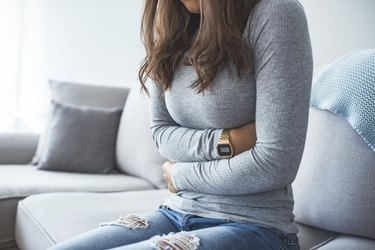
Just about everyone knows what it's like to feel too full or bloated after eating too much — in fact, a January 2020 paper in Clinical and Translational Gastroenterology states that bloating is one of the most common gastrointestinal symptoms in the United States, with 1 in 5 people experiencing it in the past week alone.
But if you're consistently bloated or have a too-full feeling after every meal, there may be something else going on other than simply eating too much.
Video of the Day
Video of the Day
In some cases, the way you eat or what you are eating may be the culprit, and in others, there may be a medical condition that's contributing to your symptoms.
Here's more information on just what can cause you to feel too full or bloated after eating, what foods may be to blame and when you should see a doctor.
1. You're Eating Too Fast or Too Much
Melissa Hooper, RDN, a dietitian in the greater Los Angeles area, tells LIVESTRONG.com that there a number of reasons why people can end up with bloating.
"It may surprise you to know it's not just the food you eat, but also the way you eat," she says.
According to Hooper, there are three common ways people eat that can lead to uncomfortable bloating:
- Eating too quickly. If you're eating your meals or snacks too quickly, you can end up with bloating as your stomach tries to catch up with the sudden influx of food or drink.
- Eating too much. Eating too quickly also puts you at risk for bloating because you're not giving your body enough time to receive the satiety "cue" that you're full. "It takes 20 minutes for your stomach to tell your brain you've had enough to eat," says Hooper. So if you're eating too fast, you may end up overeating, too, because your brain hasn't gotten the message that your stomach is full yet.
- Trapping excess air. It's easy to trap air in your stomach by drinking through a straw or eating too quickly, which can cause bloating. "Make sure to chew your food thoroughly," Hooper suggests. "The saliva breaks it down into easily digestible particles."
Read more: Do Oats Cause Bloating?

2. You're Eating Foods That Cause Gas
As you can guess, it's not just how you eat that affects how you feel after a meal, but also what you eat. Common foods that can cause bloating include certain vegetables, artificial sweeteners and items with fructans, a specific type of sugar that can be hard to digest, Niket Sonpal, MD, a New York City-based, board-certified internist and gastroenterologist and faculty member with Touro College of Medicine, tells LIVESTRONG.com.
Cruciferous veggies: "We've all heard the song about beans being the 'magical fruit,'" quips Hooper. "But in this case, it may be magical 'veggies' that are doing the trick." She notes that bloating is common with cruciferous vegetables, including broccoli, cauliflower, kale, Brussels sprouts, cabbage and bok choy.
Artificial sweeteners: "This is something most people don't know — artificial sweeteners such as aspartame remain unchanged in the digestive system," Hooper tells LIVESTRONG.com. "As in, they don't break down like regular food." That becomes a problem when your gut bacteria try to feed on them. The fact that your gut bugs can't break them down causes gas and bloating.
High-fructose foods: "Fructose, a natural sugar added to many processed foods, is difficult for many people to digest," Dr. Sonpal says. According to a January 2014 paper in Current Gastroenterology Reports, it's suspected that as fructose has become more common in our diets today, more people are unable to digest the sugar properly.
The report concluded that many people who think they have irritable bowel syndrome (IBS) actually have fructose malabsorption and intolerance instead, because humans have a limited ability to absorb fructose.
The report lists common high-fructose foods such as grapes, broccoli, asparagus, mushrooms, onions, peas, tomato products, food with wheat as a main ingredient and, of course, anything with high-fructose corn syrup.
Hooper adds that garlic and onions especially tend to be culprits for bloating because they contain a double-punch of fructans and soluble fiber.
FODMAPs: Dr. Sonpal explains that eating too many FODMAPs (an acronym for fermentable oligosaccharides, disaccharides, monosaccharides and polyols) can lead to bloating if a person is sensitive to these types of carbohydrates. According to Stanford Healthcare, FODMAPs include:
- Fructose from fruits, honey and high-fructose corn syrup
- Lactose (in dairy)
- Fructans (inulin) from wheat, onion and garlic
- Galactans from beans, lentils and legumes (soy)
- Polyols, which are sweeteners containing sorbitol, mannitol, xylitol, maltitol
- Stone fruits, such as avocado, apricots, cherries, nectarines, peaches and plums
Read more: 4 Bloat-Fighting, Low-FODMAP Breakfast Recipes
High-fat foods: "Rich and fatty food can make you feel uncomfortably full," Dr. Sonpal says. "Fat takes longer to digest than carbs or protein, so it keeps the stomach satiated longer." You may want to consider reducing the fat content in each meal to feel less bloated, he says.
Alcohol: "If you drink too much alcohol, especially beer, which is carbonated, you are going to feel bloated," Dr. Sonpal says. How much is too much varies by person.
Tip
It's possible to develop an intolerance to certain foods throughout your lifetime, so it may be helpful to keep a food journal to track what foods you're eating and when you experience the bloating to see if there's a connection.
Gluten: Hooper adds that in addition to the carbonation, beer also contains fermented carbohydrates and gluten that can cause bloating if you're sensitive to this protein. "Wheat, barley and rye can also cause issues for some people, due to the gluten," she says.
Carbonation: Carbonated drinks like soda and seltzer create more air in the stomach, leading to bloating or even belching and gas, Dr. Sonpal says.
High-fiber, high-protein diets: The above-mentioned January 2020 study in Clinical and Translational Gastroenterology found that following a high-fiber, high-protein diet may contribute to bloating more than following a high-fiber, high-carbohydrate diet. "Until further research is done, it appears that high intake of soluble fiber with higher protein intake may be the common denominators for bloating," Hooper says.

3. You Have a Gastro Issue
And no matter what you eat, or how you eat, a gastrointestinal disorder such as lactose intolerance, IBS or Celiac disease can also cause bloating, or make it worse, Dr. Sonpal says.
Irritable Bowel Syndrome
IBS is an "extremely common" gut disorder affecting between 10 and 15 percent of all people in the U.S., according to The American College of Gastroenterology (ACG).
Up to 96 percent of people with IBS report bloating as their main symptom, per a September 2014 report in Gastroenterology & Hepatology. Other common symptoms, according to the ACG, include recurring abdominal discomfort or pain along with constipation, diarrhea or both.
IBS tends to be more common in women, and although there are no exact tests to diagnose IBS or exact treatment options, it can often be managed with things like diet, lowering your stress levels and certain lifestyle changes. That's why it's important to speak with a doctor about regular bloating or other abdominal symptoms you may be having.
Celiac Disease
The National Institute of Diabetes and Digestive and Kidney Disease (NIDDK) lists bloating, or a feeling of fullness in the abdomen, as the first symptom for Celiac disease, which is a digestive disorder that damages the small intestine and is triggered by gluten, a protein in wheat, barley and rye.
As many as 1 in 141 Americans are estimated to have Celiac disease, according to the NIDDK. Other symptoms of Celiac disease include diarrhea, constipation, gas, stomach pain, vomiting and pale, foul-smelling or fatty stools that float in the toilet.
Lactose Intolerance
Lactose intolerance is a common condition caused by lactose malabsorption, which means that your body isn't able to digest lactose — a sugar found in dairy products — effectively, according to the NIDDK.
The most frequent symptoms that accompanies lactose intolerance are bloating, diarrhea, abdominal pain and gas soon after eating dairy products or anything with lactose in it, such as cow's milk, ice cream, yogurt or cheese.
4. You're Constipated
About 80 percent of people who are constipated report symptoms of being severely bloated, according to the September 2014 report in Gastroenterology & Hepatology. Per the Mayo Clinic, you're considered constipated if you've had fewer than three bowel movements in a week.
Many people with constipation try to "fix" the condition on their own without seeing a doctor. But in most cases, constipation has many factors, so if you have regular or chronic constipation, you should consult with a gastroenterologist to devise a plan of action to manage your symptoms and get to the root cause.
Read more: Struggling to Poop? Here Are 5 Foods That Can Cause Constipation (and 6 That Keep Things Moving)
5. It's Something Else
Outside of medical conditions and dietary habits that can cause bloating, Dr. Sonpal points out that certain lifestyle factors could contribute to bloating. Any of the following could cause bloating or make it worse:
- Chewing gum
- Smoking
- Wearing loose dentures (this can cause you to swallow air when you eat)
- Not eating enough fiber
When to See a Doctor
While occasional feelings of being bloated or too full after eating are nothing to be concerned about, Dr. Sonpal says that if you are regularly experiencing upper or lower abdominal pain, cramps, constipation or nausea, or if you have a change in bowel habits, rectal bleeding or vomiting (and not just after meals), you should see a gastroenterologist.
- Current Gastroenterology Reports: "Dietary Fructose Intolerance, Fructan Intolerance and FODMAPs"
- Clinical and Translational Gastroenterology: "Effects of High-Fiber Diets and Macronutrient Substitution on Bloating: Findings From the OmniHeart Trial"
- Stanford Healthcare: "Low FODMAP Diet"
- The American College of Gastroenterology: "Irritable Bowel Syndrome"
- Gastroenterology & Hepatology: "Management Strategies for Abdominal Bloating and Distension"
- American Cancer Society: "Signs and Symptoms of Stomach Cancer"
- U.S. National Library of Medicine: "Malabsorption Syndromes"
- International Foundation of Gastrointestinal Disorders: "About GERD"
- Harvard Health Publishing: "What to Do When Gas Gets You Down"
- National Institute of Diabetes and Digestive and Kidney Disease:"Definition & Facts for Constipation"
- U.S. National Library of Medicine: "Gluten Sensitivity"
- National Institute of Diabetes and Digestive and Kidney Disease: "Symptoms and Causes of Celiac Disease"
- Mayo Clinic: "Constipation"
Is this an emergency? If you are experiencing serious medical symptoms, please see the National Library of Medicine’s list of signs you need emergency medical attention or call 911.